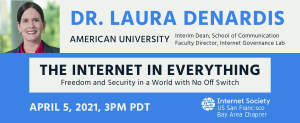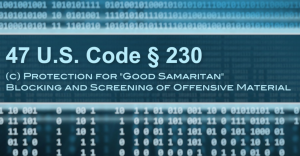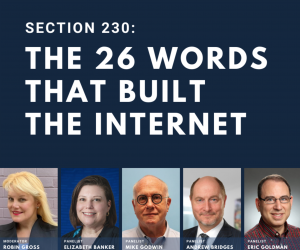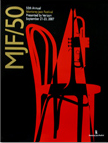SF Bay ISOC Tech Policy Webinar 7 June
The US Supreme Court set an important legal precedent regarding copyright law and computer code in it’s April 2021 landmark legal ruling (Google, LLC v. Oracle America, Inc.) when it ruled that Google’s use of Java Application Programming Interface (API) codes is lawful fair use.
The decade-long litigation stems from Google’s use of API codes which are owned by Oracle, to build a new software platform for mobile phones, the Android platform. Oracle argued that Google’s use of the Java API codes to build new programs was an infringement on Oracle’s copyright in the software.
 San Francisco Intellectual Property Blog
San Francisco Intellectual Property Blog



 I’m moderating a tech policy webinar for the SF Bay Area Internet Society chapter on 5 April 2021 with leading Internet governance academic Dr. Laura DeNardis. Details below – all are welcome to attend and the webinar will be viewable on our chapter’s YouTube channel.
I’m moderating a tech policy webinar for the SF Bay Area Internet Society chapter on 5 April 2021 with leading Internet governance academic Dr. Laura DeNardis. Details below – all are welcome to attend and the webinar will be viewable on our chapter’s YouTube channel. On 11 March 2021, a three-judge panel of the Court of Appeals for the Second Circuit unanimously upheld a ruling issued from the Southern District in New York that dismissed a lawsuit brought by James Domen and Church United alleging Vimeo discriminated against them for deleting the Church United’s account from its online video hosting platform. Both the lower court and the appellate court found that Section 230 of the Communications Decency Act (“CDA”) immunizes Vimeo from this lawsuit.
On 11 March 2021, a three-judge panel of the Court of Appeals for the Second Circuit unanimously upheld a ruling issued from the Southern District in New York that dismissed a lawsuit brought by James Domen and Church United alleging Vimeo discriminated against them for deleting the Church United’s account from its online video hosting platform. Both the lower court and the appellate court found that Section 230 of the Communications Decency Act (“CDA”) immunizes Vimeo from this lawsuit.
























